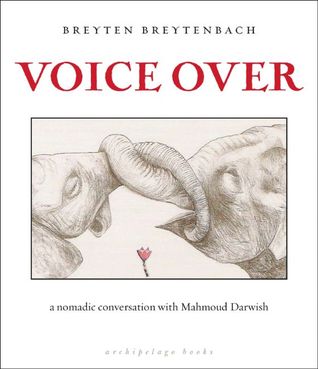A great poet is one who makes me small when I write, and great when I read.
A River Dies of Thirst, the last volume of Mahmoud Darwish’s work to be released in Arabic, just eight months before his death in 2008, offers a precious opportunity to spend a little more time with a great poet as he casts a sorrowful eye at his beloved Palestine, and reflects on love, life, time, and memory. But more than anything this collection of poems, reflections, and journal fragments is a meditation on what it means to be a poet. And for him that is a distinctive vision, for Darwish was not only one of the most remarkable and humane poets of our time, but he gave voice to the Palestinian consciousness and was someone who believed that “every beautiful poem is an act of resistance.”
 To read this final collection now, more than eleven months into the longest, deadliest sustained attack on Palestinian citizens since the creation of the Israeli state, is to hear that voice of resistance resounding so clearly that it is almost unsettling. So many of the pieces here feel as if they could have been written yesterday, beginning with the opening poem “The girl/The scream”:
To read this final collection now, more than eleven months into the longest, deadliest sustained attack on Palestinian citizens since the creation of the Israeli state, is to hear that voice of resistance resounding so clearly that it is almost unsettling. So many of the pieces here feel as if they could have been written yesterday, beginning with the opening poem “The girl/The scream”:
On the seashore is a girl, and the girl has a family
and the family has a house. And the house has two windows
. and a door.
And in the sea is a warship having fun
catching promenaders on the seashore:
Four, five, seven
fall down on the sand. And the girl is saved for a while
because a hazy hand
a divine hand of some sort helps her, so she calls out: ‘Father
Father! Let’s go home, the sea is not for people like us!’
Her father doesn’t answer, laid out on his shadow
windward of the sunset
blood in the palm trees, blood in the clouds
The girl becomes the endless scream, echoing without echo across the land, as an aircraft returns to bomb the house with two windows and a door, silencing her family’s story.
This heartbreaking image is followed by a series of poems and short prose pieces that speak to war and Palestinian suffering in Lebanon, Gaza, and the West Bank. The uncanny timelessness of his poetry betrays the truth: there is nothing new about what we are witnessing today save for the intensity. And as Darwish reminds it, the violence is not just directed at people—it is an attack on the land, on nature, and the memory held in the soil. Consider the olive tree, the venerable grandmother-like figure, “modest mistress of the hillside.” She is spoken of with reverence: “In her restrained silvery greenness is a colour too shy to declare itself openly, a glance toward something beyond description, for she is neither green nor silver. She is the colour of peace, if peace needs a colour to distinguish it.” It is message lost on the occupying forces:
But these soldiers, these new soldiers, surround her with bulldozers and uproot her. They crush our grandmother, so that now her branches are in the earth and her roots in the air. She did not weep or shout, but one of her grandsons who witnessed the execution, threw a stone at a soldier and was martyred alongside her. When the soldiers left triumphantly, we buried him there, in the deep hole, our grandmother’s cradle. For some reason we were convinced that after a while he would become an olive tree, spiky and – green!
(from “The second olive tree”)
As a late work by a poet who is simultaneously conscious of his timelessness and his mortality, it feels as if Darwish is allowing himself to focus his attention on what is most important to him as he knows, not necessarily that his own end is as near as it would happen to be, but that time, and the heart, has its limits. As such, the themes that recur throughout these pieces reflect elements common to all his work, but are tinged with the melancholy that comes with age and a long life marked by exile and the ongoing occupation of his homeland.
Amid the poems that reference war and occupation directly—the more political pieces—are quieter reflections on the poetic existence, that is, on poetry as a way of being and engaging with world. Darwish is a poet immersed in his environment, the sights, scents and sounds all echoing longing and loss, but now the atmosphere evoked is more ephemeral, his awareness more attuned to the spaces between sleep and waking, in the flickering shadows where words might be found:
Leaves in summer whisper modestly, call out shyly, as if to me alone, stealing me away from the burden of material existence to a place of delicate radiance: there, behind the hills, and beyond the imagination, where the visible equals the invisible, I float outside myself in sunless light. After a short sleep like an awakening, or an awakening like a short sleep, the rustling of the trees restores me to myself, cleansed of misgivings and apprehensions.
(from “Rustling”)
There is also a more direct engagement with the idea of writing poetry and recollections of his past encounters with other prominent poets, their conversations and interactions. And the two sections of fragments that round out this collection contain many wise observations about the life, identity, perception and, of course, poetry.
With a total of 127 short pieces—including fully finished poems (both prose poems and verse), commentaries, and assorted observations and aphorisms—A River Dies of Thirst is a collection that may be best read slowly, taking in a little at a time. There is so much beauty in the language and so much to reflect on. It might also serve as a good introduction for those who have yet to hear Darwish’s masterful voice. And this certainly is the time to listen.
A River Dies of Thirst by Mahmoud Darwish is translated from the Arabic by Catherine Cobham and published by Archipelago Books.





